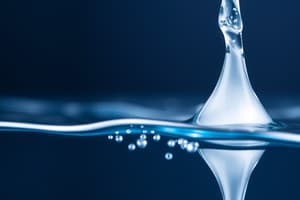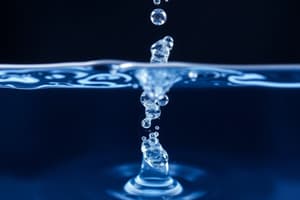Podcast
Questions and Answers
Which property of water describes its ability to form bonds with itself?
Which property of water describes its ability to form bonds with itself?
- Polarity
- Cohesion (correct)
- Surface tension
- Adhesion
What term is used for molecules that do not dissolve in water?
What term is used for molecules that do not dissolve in water?
- Aqueous solutions
- Hydrophilic molecules
- Hydrophobic molecules (correct)
- Solutes
What does the term 'solvent' refer to in aqueous solutions?
What does the term 'solvent' refer to in aqueous solutions?
- The substance that dissolves another substance (correct)
- The substance that is dissolved
- A polar molecule
- The overall mixture of solute and solvent
How does the polar nature of water affect its interaction with other substances?
How does the polar nature of water affect its interaction with other substances?
What is surface tension a measure of?
What is surface tension a measure of?
What is the specific heat capacity of water?
What is the specific heat capacity of water?
Ice floats because it is denser than liquid water.
Ice floats because it is denser than liquid water.
What determines the V-shape of a water molecule?
What determines the V-shape of a water molecule?
How many hydrogen bonds does ice have?
How many hydrogen bonds does ice have?
Water molecules in ice have a ______ lattice-like structure.
Water molecules in ice have a ______ lattice-like structure.
Why does water have a high specific heat?
Why does water have a high specific heat?
Flashcards are hidden until you start studying
Study Notes
Water is Crucial for Life
- All living organisms require water for survival.
Water as a Solvent
- Water is a common solvent, forming aqueous solutions.
- A solvent dissolves a solute.
- Solutes are substances dissolved in a solvent.
Water's Polarity
- Water molecules have an uneven distribution of charge, making them polar.
- Polarity is a characteristic of molecules with uneven charge distribution.
- Polar molecules are hydrophilic (water-loving) and dissolve in water.
- Non-polar molecules are hydrophobic (water-fearing) and do not dissolve in water.
Hydrogen Bonding
- Water molecules can form hydrogen bonds with each other.
- Hydrogen bonding contributes to water's unique properties.
Cohesion and Surface Tension
- Cohesion is the attraction of water molecules to each other.
- Cohesion leads to high surface tension, the resistance to breaking the surface of a liquid.
Adhesion
- Adhesion is the attraction of water molecules to other molecules and surfaces.
Water's High Specific Heat
- Water has a high specific heat capacity, meaning it requires a large amount of heat to change temperature.
- This is due to the hydrogen bonds between water molecules, which require energy to break.
- The strong attractions between water molecules impede the kinetic energy of the molecules and require more energy to increase their temperature.
Water's Molecular Shape
- Water molecules have a distinctive V-shape.
- This shape is because oxygen has a high electronegativity, attracting electrons more strongly than hydrogen.
- This creates a polar covalent bond, giving the water molecule a partial negative charge on the oxygen atom and partial positive charges on the hydrogen atoms.
Ice Floats
- Ice floats because it is less dense than liquid water.
- This is due to the unique hydrogen bonding pattern in ice.
- Ice has a more open, lattice-like structure compared to liquid water, resulting in fewer water molecules packed in a given volume.
- The open structure of ice is caused by the formation of four hydrogen bonds per water molecule, while liquid water has an average of ~3.4 hydrogen bonds.
Studying That Suits You
Use AI to generate personalized quizzes and flashcards to suit your learning preferences.




